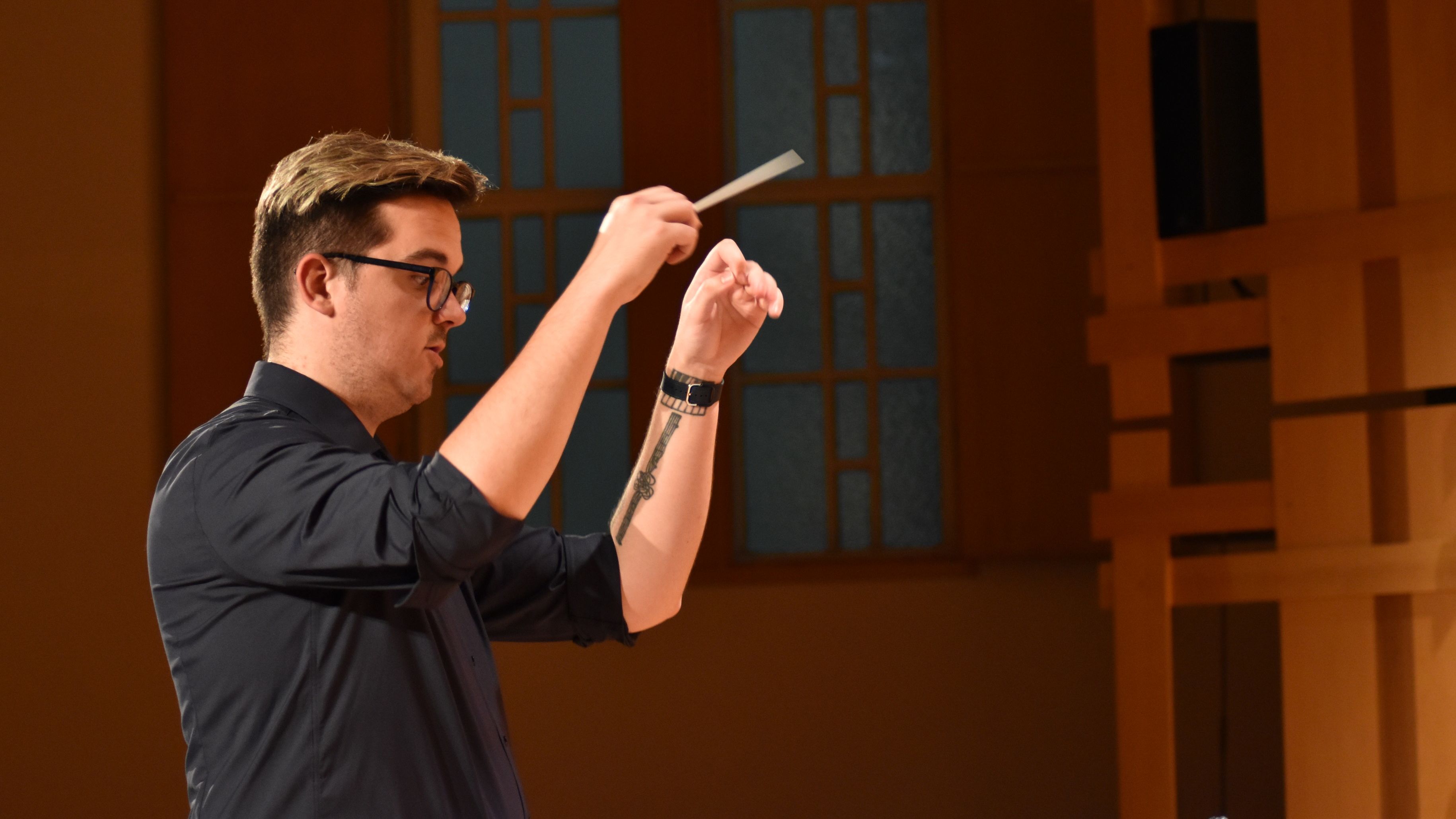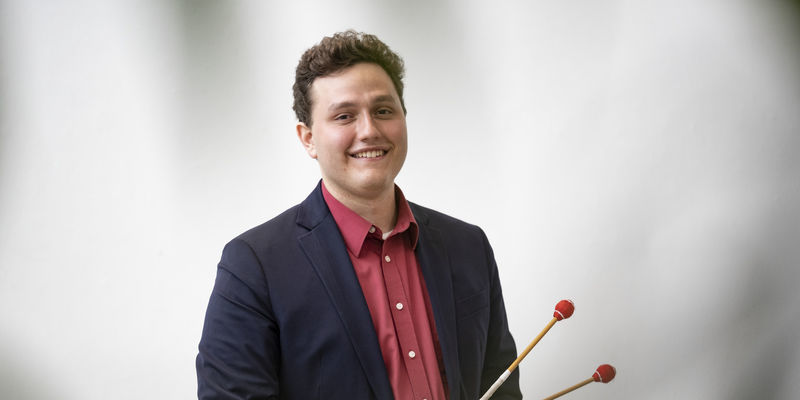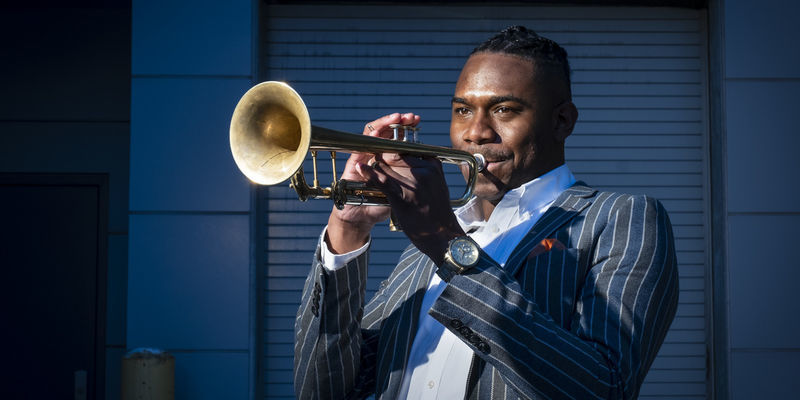Boyer PhD student and Presser Award recipient releases album honoring Black choral music
Baker Purdon’s debut album, Walking Through the Valley, includes work by Black composers, nearly all of which is being recorded for the first time.

This past July, Boyer College of Music and Dance PhD student Baker Purdon released his debut album, Walking Through the Valley: Choral Music from Black Composers, 1919–2022. The project is a triumphant celebration of works by Black composers, and nearly all of the music on the album has never before been recorded.
Following the summer of 2020 when protests erupted across the country in response to the murder of George Floyd at the hands of police, Purdon had become increasingly interested in exploring the work of Black composers. He was especially inspired by the work of conductors such as Philip Brunelle, whose choral group VocalEssence has been highlighting the music of Black composers for decades.
The album is entirely composed of choral work by Black composers written between the years 1919 and 2022. It includes the first known recordings of works by familiar names in the classical music space, such as “Credo” by Margaret Bonds and “O Southland” by Harry T. Burleigh.
“There are two Burleigh pieces at the beginning of the album, and he’s a composer that most singers know for his solo voice spirituals,” Purdon said. “We’ve all sung ‘Nobody Knows the Trouble I’ve Seen,’ the Harry Burleigh arrangement. But I kept looking around and no one recorded any of his choral music, and it’s really beautiful stuff.”
The album acknowledges the barriers and prejudices that have prevented Black music from being enjoyed by a larger audience throughout American history. “The big picture is that the arts need money, and we just didn’t give that money to nonwhite artists for most of the 20th century,” he said, adding that Black composers have historically been marginalized in the music world outside of certain genres. “Black musicians don’t just write spirituals. Black musicians don’t just do jazz. But we’ve pigeonholed them into that for a really long time.”
Purdon, who is a white conductor, acknowledges the role he can play in uplifting the work of Black musicians in a statement he released with the album. “It is clear that I do not physically represent the stories being told through this recording project,” the statement on his website reads. “It is the duty and responsibility of those with majority identities in positions of power to focus their energy on changing our systems and our society to allow everyone to experience the privilege we possess.”
While working on the album, Purdon drew inspiration from composer Marques L.A. Garrett—the album’s title track is also the title of a composition by Garrett. Garrett’s work is at the forefront of non-idiomatic music by Black composers, which refers to concert music that is not a part of the genres typically associated with Black musicians, like jazz, hip-hop and spiritual music.
Purdon even utilized Garrett’s database of non-idiomatic works to help find music to include on the album, focusing on works that were accessible and could be performed by anyone. He also focused on works that could be used to spark discussions about racism in the United States.
“I wanted to make sure that if I pull this music up with a choir, that it gives us an opportunity to have a conversation,” Purdon said. “How can we unpack what is being talked about in these works? I think music educators have such a gift in that we get to use music as a vehicle to have these really difficult conversations.”
Purdon, who is pursuing a doctoral degree in music education and choral conducting and is set to graduate in the spring of 2024, began developing the project at the end of 2021 before applying for The Presser Graduate Music Award. The award is given out annually to 16 students, one from each of the participating graduate schools around the country. To earn the award, applicants must demonstrate that they have the potential to make a distinguished contribution to the field of music.
Purdon applied for The Presser Graduate Music Award at the beginning of the spring 2022 semester. He was announced as the recipient of the award in the amount of $10,000 in April, and he immediately got to work building a team to record the album with him.
To find singers to perform on the album, Purdon worked closely with fellow Boyer PhD student Arreon Harley-Emerson, director of the Choir School of Delaware and a leader in the space of diversity in choral conducting.
“If the whole point of this project is to elevate Black voices in choral music, then you have to pay the Black voices to do it,” Purdon said. “So 75% of the singers on the album were singers of color from the areas of Philadelphia and Delaware.”
Purdon also called upon David Pasbrig, associate professor at Boyer and renowned recording engineer, to serve as producer on the record. Pasbrig led the album’s recording sessions, which took place entirely at Rock Hall over the course of two days this past June. Pasbrig then handled all of the post-production and editing work, and the album was released on July 22.
Since releasing Walking Through the Valley, Purdon has been serving as the inaugural Graduate Music Fellow for The Presser Foundation, where he is continuing his mission of supporting the music of marginalized communities in the arts. In his role, Purdon provides a critical look at the diversity efforts of the organizations The Presser Foundation works with.
“I’m working with these organizations and asking, what are they doing? What music are they performing? How are they engaging with the community? And trying to help the foundation figure out, how do we better support diversity?” Purdon said.
Dec. 2023 update: Purdon’s album was recognized with two awards from the The American Prize in 2023. The album won first place in the Ernst Bacon Memorial Award for the performance of American Music category, and second place in the Choral Performance—professional division category.


